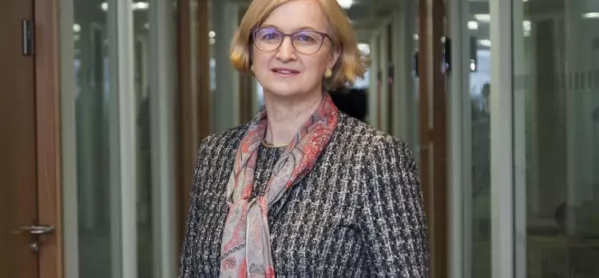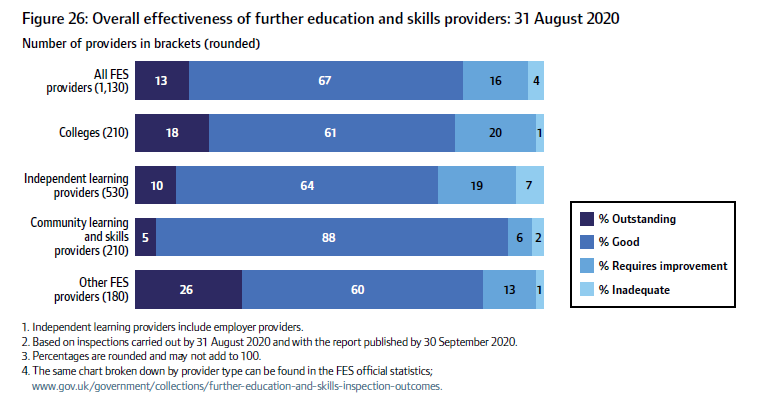Ofsted annual report: What it says about colleges

The number of further education providers found to be “good” or “outstanding” by Ofsted has remained stable at eight out of 10, according to Ofsted.
The inspectorate’s annual report, published this morning, found that the proportion of providers judged “good” or “outstanding” has not changed since last year.
It adds that the best-performing provider types were community learning and skills providers and 16-19 academies, while independent learning providers had the lowest proportion of “good” or “outstanding” judgements. Sixty-four per cent were graded “good”, and one in 10 “outstanding”.
More on this: What will Ofsted’s interim visits actually look like?
News: Ofsted to visit FE providers from 28 September
Background: Ofsted visits to be ‘collaborative conversations’
That compares to sixty-one per cent of colleges graded “good”, and 18 per cent “outstanding”.
The report reveals that adult learning programmes were one of the most successful provision types in FE this year, while provision for learners with high needs had the highest proportion of “outstanding” grades at 12 per cent. Apprenticeships were one of the least successful provision types, with “too many judged ‘inadequate’ (10 per cent)”.

Ofsted says: “In [further education and skills], effectiveness of leadership and management and quality of education were the two key judgements with profiles most similar to overall effectiveness. In common with schools, in providers with overall effectiveness judgements of less than ‘good’, it is not uncommon to see positive recognition in other areas, such as behaviour and attitudes and personal development.
“In addition, almost half of FES providers inspected in 2019-20 were receiving their first full inspection. The judgement profile of these new providers is very similar to the profile across other providers. The biggest difference (although based on small numbers of inspections) was in personal development, where 67 per cent of new providers received a ‘good’ or ‘outstanding’ judgement compared with 74 per cent of other providers. Judgements about behaviour in new providers (76 per cent) were also slightly lower than in other providers (81 per cent).”
Online survey
Ofsted stopped inspections once the coronavirus pandemic hit. A survey of online provision in FE showed that online education needs to be well integrated into the provider’s curriculum offer as a whole and adapted to the learning needs of learners in order to work effectively. “Teachers need to be suitably able and trained to use it. Learners miss the face-to-face contact of the classroom, not only for social interaction but also for the instant feedback and opportunity to ask questions that it provides,” says Ofsted. “Some providers say their learners’ engagement is good simply because learners have logged on to online sessions. The reality may be that the learners have logged on but are doing other things, and so are not fully engaged in the learning.
“To avoid those without sufficient access to online devices and connectivity falling behind, the Department for Education, colleges and other providers need to invest in this as well as in a suitable
virtual learning environment and staff training. These lessons from FES are likely to apply to schools as well. Online education is likely to have less benefit for younger children.”
Interim visits
This autumn, Ofsted began carrying out interim visits. Today’s annual report says that most providers visited had remained open during the first national lockdown and continued to deliver provision remotely. “To do this, many had changed their courses to be either fully remote or a mixture of remote and face-to-face teaching.
“This move to remote learning often resulted in shifting around of course content, for example teaching theoretical work remotely and fitting in practical sessions in the autumn. A few leaders had started to change what they were teaching in response to changes in the economy and job market.”
Ofsted says that some learners missed the socialisation that face-to-face learning brought them and found it challenging to engage with learning remotely. Others said that they liked the additional flexibility and independence that remote learning gave them.
“Many of the leaders we spoke to also felt financial pressures. They said the pandemic had increased their costs at the same time as reducing their income streams and destabilising future funding.”
You need a Tes subscription to read this article
Subscribe now to read this article and get other subscriber-only content:
- Unlimited access to all Tes magazine content
- Exclusive subscriber-only stories
- Award-winning email newsletters
Already a subscriber? Log in
You need a subscription to read this article
Subscribe now to read this article and get other subscriber-only content, including:
- Unlimited access to all Tes magazine content
- Exclusive subscriber-only stories
- Award-winning email newsletters
topics in this article



